5 Best IBS Supplements, According to Doctors

Supplements can help you with any number of things. Some of us take them to combat vitamin deficiencies, while others use dietary supplements to aid in everything from hair growth to weight loss. But if you’re someone who is suffering from irritable bowel syndrome (IBS), you may not realize that these over-the-counter aids could actually provide some much-needed relief. We consulted doctors and other health experts for their picks on the most effective options. Read on to discover the best IBS supplements you should add to your diet.
RELATED: 9 Supplements That Can Damage Your Stomach, Doctors Say.
What Is IBS?

IBS, which stands for irritable bowel syndrome, is a “functional gastrointestinal (GI) disorder,” according to the National Institutes of Health (NIH). It’s caused by a disruption in how your brain and gut work together, which results in a “group of symptoms that occur together, including repeated pain in your abdomen and changes in your bowel movements, which may be diarrhea, constipation, or both.”
In other words, “it is the tendency of a person’s digestive system to react negatively to certain foods, often in unpredictable ways,” certified nutritionist Catherine Rall tells Best Life. “The central symptom to look for is irregular bowel movements: constipation one day, diarrhea the next.”
The American College of Gastroenterology (ACG) says that IBS is one of the most common disorders seen by doctors in the U.S.; it’s estimated that the condition affects 10 to 15 percent of adults in the country. It is also more common in women, with almost twice as many women having IBS than men.
“We do not really know why women get IBS easier than men,” the ACG explains on its website. “It does not seem to be because they have different hormones than men. It seems to be because women may feel sensations from the intestines differently.”
As for what causes IBS? Unfortunately, that’s not so clear either.
“It is believed to be related to abnormalities in the gut-brain axis and changes in intestinal motility, but the exact cause of IBS is still not fully understood,” says Jeoff Drobot, NMD, medical director of the American Center For Biological Medicine and founder of Cerebral Fit.
RELATED: 8 Best Foods to Eat If You Have IBS, According to Doctors.
How Can Supplements Help People With IBS?

IBS is a “long-term, chronic disorder,” and there is no known cure for it, according to Cedars-Sinai.
“Health experts don’t know what causes IBS. They also don’t know how to stop it from happening,” the experts at Cedars explain.
But there are a “wide variety of treatment options” for people with IBS that can work to alleviate their symptoms and help them live more comfortably, according to the ACG. One of those options is taking supplements.
“Supplements provide relief from digestive discomfort and help maintain a healthy balance of gut bacteria,” Drobot shares. “Some supplements can also support overall gut health by reducing inflammation and promoting proper digestion such as probiotics, digestive enzymes, and fiber supplements. They can also help alleviate specific symptoms, like bloating, diarrhea, or constipation.”
RELATED: 7 Best Supplements to Take If You’re Over 60, Doctor Says.
5 IBS Supplements Doctors Recommend
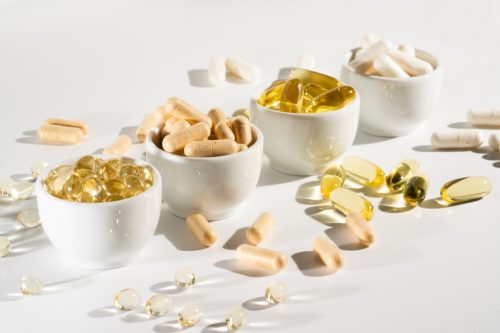
Of course, if you go to the pharmacy or a supplement store, you’ll likely be overwhelmed by the multitude of options. So, which ones should you pick up if you’re looking to improve your gut health? Read on for five supplements doctors recommend for people looking to treat their IBS.
1. Probiotics
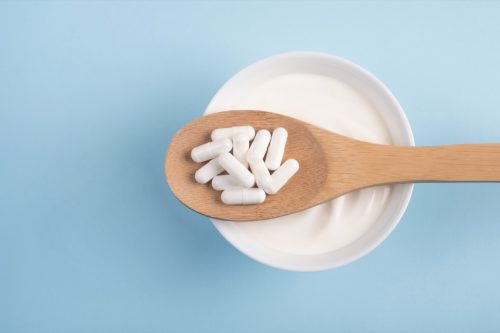
While there are several supplements that can help with IBS, “the most important ones to try are probiotics, since they’re a cornerstone of good digestive health for everyone,” according to Rall.
“They promote the growth of healthy gut bacteria, which in turn break down the foods we eat to make them easier for our bodies to digest and help to reduce inflammation,” she explains.
Geriatric physician Veronika Matutyte, MD, agrees, adding that probiotics can “help alleviate symptoms like bloating and irregular bowel movements by restoring equilibrium in the digestive tract.”
When it comes to which specific probiotics you should get, experts recommend looking for those that contain at least one of two bacteria: Bifidobacterium and Lactobacillus.
RELATED: The 5 Best Anti-Aging Probiotics, Doctors Say.
2. Fiber Supplements
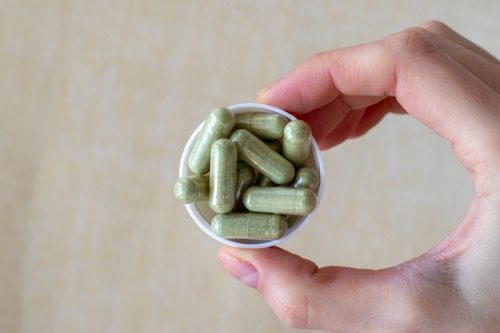
Fiber is also an “essential component of a healthy diet and crucial to digestive health,” says Kubanych Takyrbashev, MD, health and wellness advisor at NAO. That’s why it can be so beneficial to those struggling with IBS.
“Soluble fiber, such as that found in psyllium husk, dissolves in water to form a gel-like substance in the digestive tract,” Takyrbashev explains. “This type of fiber can help regulate bowel movements by softening stool and promoting regularity, which can be particularly beneficial for individuals with IBS who experience constipation.”
But you should be cautious about seeking out supplements with insoluble fiber, which doesn’t dissolve in water the way that soluble fiber does.
“Insoluble fiber supplements can worsen symptoms like bloating and gas in some people with IBS, so I advise using them carefully with guidance from a healthcare professional,” Takyrbashev cautions.
RELATED: 7 Best Fiber Supplements for Weight Loss, According to Dietitians.
3. Peppermint Oil
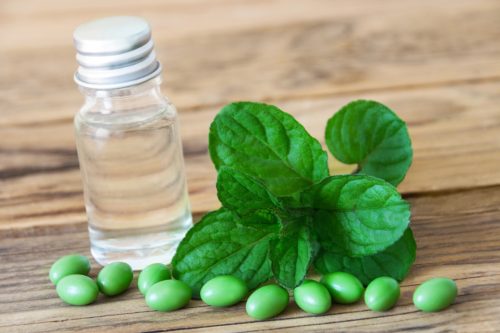
If you are looking to manage IBS symptoms such as abdominal pain and bloating, peppermint oil capsules may “offer a promising solution,” Takyrbashev says.
This is because the key ingredient in peppermint oil is menthol, which “has a relaxing effect on the muscles of the intestines,” he explains.
“This can help alleviate intestinal spasms or cramping symptoms, providing much-needed relief for those struggling with discomfort,” Takyrbashev continues. “Additionally, the use of enteric-coated capsules ensures that the peppermint oil reaches the intestines intact, where it can exert its therapeutic effects most effectively.”
4. Digestive Enzymes
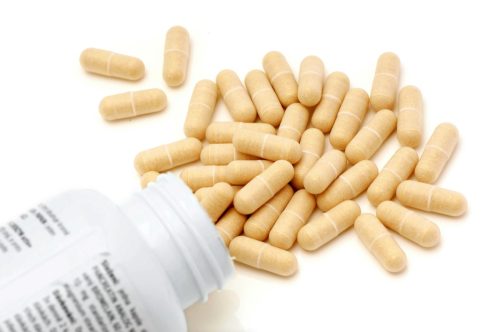
Digestive enzymes are another dietary supplement health experts recommend for individuals with IBS, as they can “aid in breaking down food properly,” according to Drobot.
By helping to properly break down fats, proteins, and carbohydrates, digestive enzymes are useful for “improving digestion and reducing symptoms like bloating and gas,” Matutyte adds.
5. Fish Oil
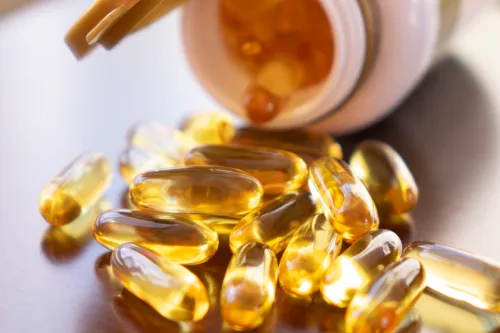
Many people use fish oil supplements for their known health benefits, but did you know they can also help if you have IBS?
“Fish oil supplements contain omega-3 fatty acids, such as eicosapentaenoic acid (EPA) and docosahexaenoic acid (DHA), which have anti-inflammatory properties,” Takyrbashev shares. “Inflammation can contribute to symptoms of IBS in some individuals, and omega-3 fatty acids help reduce inflammation in the gut, potentially alleviating symptoms such as abdominal pain and diarrhea.”
Fish oil might also be a good choice for people who need different types of supplements, as “fish oil supplements are available in various forms, including capsules and liquid oils,” Takyrbashev adds.
RELATED: 10 Surprising Benefits of Taking Fish Oil Every Day.
What Kinds of Foods or Supplements Should People With IBS Avoid?

Of course, supplements are only one method of treating IBS. Much of your ability to live with this disorder comes down to the food that you’re eating or not eating, which will vary from person to person.
“IBS can present differently for everyone,” says Dédé Wilson, professional recipe developer and co-founder of FODMAP Everyday.
The FODMAP diet involves eating foods low in fermentable oligosaccharides, disaccharides, monosaccharides and polyols, which are sugars that can cause intestinal distress, according to Johns Hopkins Medicine. This diet was designed for people with IBS to help them figure out which foods are causing them issues.
“The low FODMAP diet is a temporary eating plan that’s very restrictive,” Johns Hopkins gastroenterologist Hazel Galon Veloso, MD, says. “It’s always good to talk to your doctor before starting a new diet, but especially with the low FODMAP diet since it eliminates so many foods—it’s not a diet anyone should follow for long. It’s a short discovery process to determine what foods are troublesome for you.”
But certain supplements, like probiotics, can cloud the data doctors are trying to gather when monitoring someone on a FODMAP diet, Wilson cautions. With that in mind, you’ll need to hold off if you’re in the process of learning how different foods affect you.
“You want to know which foods are triggering your symptoms, and if the probiotics are helping your digestion, you will never learn,” she explains. “Supplements can help those with IBS when the patient works in conjunction with a registered dietitian (RD) and gastroenterologist, and their entire medical presentation is assessed.”
In general, Drobot advises consulting with your doctor or RD before starting any new supplement regiment, adding that it’s “important to note that not all supplements work for everyone with IBS.”

As for what kinds of foods people with IBS should avoid, Drobot says he would “never recommend avoiding any specific food group entirely, as that can lead to nutrient deficiencies.” Still, he notes that there are certain foods that are known to commonly trigger symptoms in individuals with IBS.
“These include high-fat foods, caffeine, alcohol, spicy foods, dairy products, and artificial sweeteners,” he says. “These types of food can exacerbate symptoms such as bloating, diarrhea, and abdominal pain in some people with IBS.”
According to Matutyte, high-fat foods include “greasy or fried foods that can be difficult to digest and may worsen symptoms of IBS, particularly diarrhea.”
On top of that, she says caffeine and alcohol are known to irritate your gastrointestinal tract, which can make symptoms like diarrhea and abdominal pain worse.
Drobot recommends that individuals with IBS keep a food diary and track their symptoms after eating certain foods so they can help identify their own specific triggers.
“While supplements can be beneficial for managing IBS symptoms, it’s essential to approach their use as part of a comprehensive treatment plan that includes dietary modifications and lifestyle changes,” Matutyte concludes. “Consulting with a healthcare provider can help determine the most suitable supplements and dietary strategies for your individual needs.”
RELATED: 5 Best Foods to Fight Inflammation, Doctors Say.
Wrapping Up
That’s it for our expert-backed guide on the best supplements you can take to help with your IBS. But be sure to check back with us soon for more health tips that can make all the difference when it comes to feeling your best every day.
Best Life offers the most up-to-date information from top experts, new research, and health agencies, but our content is not meant to be a substitute for professional guidance. When it comes to the medication you’re taking or any other health questions you have, always consult your healthcare provider directly.